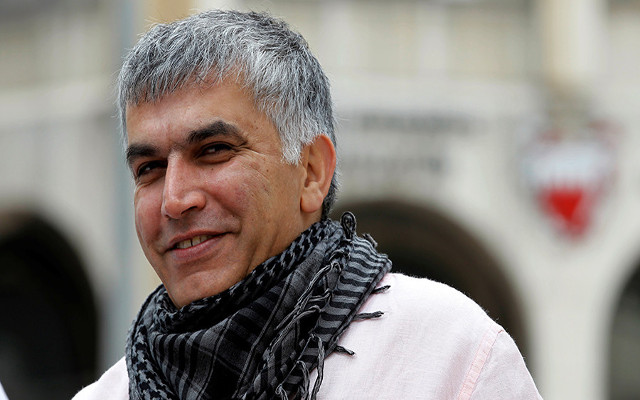22 November 2017 – On Wednesday, 22 November, a Bahraini appeals court upheld a two-year prison sentence against human rights defender Nabeel Rajab. The verdict concludes a series of appeals hearings which have repeatedly been postponed by Bahraini authorities. Americans for Democracy & Human Rights in Bahrain (ADHRB) strongly condemns the denial of Rajab’s appeal and calls upon the Government of Bahrain to release him and all other activists who have been imprisoned for their peaceful expression.
Rajab has been repeatedly targeted and arrested because of his human rights work. In the most recent round of charges, he was detained on 13 June 2016 for tweeting and/or retweeting about torture in Bahrain’s notorious Jau Prison, and for statements made in press interviews. Since December 2016 his continued detention has been justified as preventive custody pending the conclusion of his trial on the media-related charges. Roughly nine months of this total period of 17 months in detention were spent primarily in solitary confinement.
This most recent rejection of Rajab’s defense came on appeal of the case concerning his televised interviews. His final recourse on appeal is to the Court of Cassation, Bahrain’s highest judicial authority.
In addition to rejecting Rajab’s appeal in the interviews case, the court today postponed his next hearing in the Twitter trial until New Year’s Eve. The New Year’s Eve trial will mark the 18th hearing in that case. He faces 15 years in prison on the Twitter-related charges, which comprise “broadcast and dissemination of false and biased news and rumors about internal conditions in the Kingdom tending to detract from the its reputation and prestige,” in the words of Bahrain’s Office of Public Prosecution this morning. In total he faces up to 17 years in prison: two years for the interviews and 15 years for the tweets. This is in addition to the period of more than a year that he has already spent in detention pending trial.
Concurrent with the ongoing appeals process, Rajab was transferred to Jau prison on 26 October, where he was immediately subjected to arbitrarily degrading treatment. All his personal hygiene items, clothing, and books were confiscated. Bahraini prisons do not supply prisoners with basic hygienic items like soap; instead, detainees are forced to purchase these items at the prison commissary. All the confiscated personal possessions were things Rajab had been allowed to have in detention up to that point while being held at the al-Qalaa detainees’ clinic. In any event, none of these items present any conceivable security risk. Their confiscation was plainly an act of punishment. In addition, on the same date he was admitted to Jau, prison guards entered Rajab’s cell at night after he had gone to sleep, shouting abuse at him, on the pretext of conducting a search. Rajab had of course already been subjected to a search of his person upon entering the prison, and was under the total physical custody and control of prison guards from the time he walked into Jau up to the time he went to bed. Again, the purpose was patently not prison security but punishment and humiliation.
Rajab’s attorney has submitted a complaint to the Ministry of Interior Ombudsman about the degrading treatment at Jau. Yesterday, Bahrain’s embassy in Brussels disseminated a statement including the following line: “[T]he Independent Ombudsman’s response [to Rajab’s account of the degrading treatment at Jau] was that: ‘Whilst it is regrettable that night time random searches disturb sleeping inmates, you will appreciate that illicit substances and weapons in prison cause terrible tragedies and searches are regrettably very necessary.’” This is the second time this month (the other instance being the Bahraini Embassy in London’s statement of 2 November on the AlWadaei family) that a Bahraini embassy has adduced conclusions by the Ombudsman in support of the government’s political position. In neither case was any information about the Ombudsman’s supposed investigation communicated to the victims themselves. This is clear circumstantial evidence that the Ombudsman acts in coordination with the political branches of the Bahraini government, as an adjunct to its political goals, and is not an independent human rights monitor as it is held out to be.
Husain Abdulla, Executive Director of ADHRB: “The prolonged persecution of Nabeel Rajab as a result of his human rights work must end. No individual should suffer in such a manner for exercising their right to speak freely and stand up for the principles they believe in. The United States and other international actors must rally to support this man and his cause. A Bahrain that jails its critics should not be allowed to act without consequences by the global community.”
Prominent organizations and individuals have recently spoken out against the Bahraini government’s treatment of Nabeel and called for his release. This includes several Senators on the Foreign Relations Committee, such as Marco Rubio, who tweeted that the charges against Rajab are “outrageous” and called for his release. The State Department says that it was “disappointed by the verdict” in Rajab’s case and echoed Rubio’s call for Rajab’s immediate release. Fifteen human rights organizations have sent letters to the United States, the United Kingdom, the European Union, and other governments asking them to support Rajab “by condemning his sentencing and calling for his immediate and unconditional release, and for all outstanding charges against him to be dropped.” Yesterday, 21 November, ADHRB attempted to deliver a petition calling for Nabeel’s release and containing over 15,000 signatures to the Bahraini Embassy in Washington, DC, but the petition was refused by Embassy personnel.
ADHRB condemns the continued detention and prosecution of Nabeel Rajab. Rajab has worked peacefully to uphold human rights in Bahrain and should not be punished for doing so. The government should immediately release him and drop all charges based on Rajab’s exercise of his right to free speech. The government of Bahrain cannot be allowed to continue silencing and jailing those who disagree with its policies.





